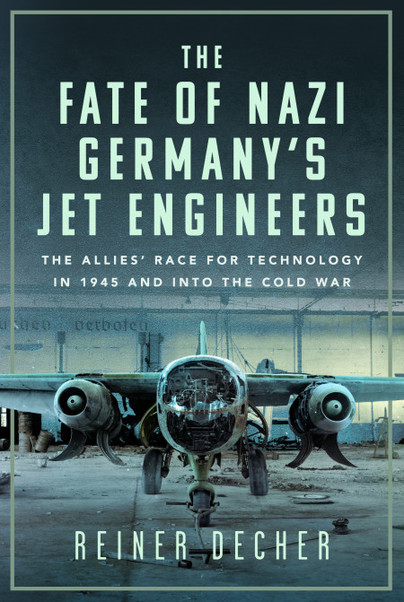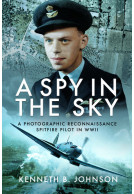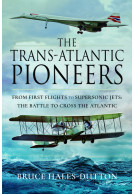Powering the World's Airliners (Hardback)
Engine Developments from the Propeller to the Jet Age
Imprint: Air World
Pages: 218
Illustrations: 95
ISBN: 9781526759146
Published: 16th March 2020
Youtube!
Bruships 87: Books Found on My Travels, New Books & Christmas Recomendations - YouTube
Dr Alexander Clarke Does Naval History Live - Skip to 33:28
(click here for international delivery rates)
Need a currency converter? Check XE.com for live rates
| Other formats available - Buy the Hardback and get the eBook for free! | Price |
|---|---|
| Powering the World's Airliners eBook (19.3 MB) Add to Basket | £6.99 |
The first efforts of man to fly were limited by his ability to generate sufficient power to lift a heavier-than-air machine off the ground. Propulsion and thrust have therefore been the most fundamental elements in the development of aircraft engines.
From the simple propellers of the first airliners of the 1920s and 1930s, to the turboprops and turbojets of the modern era, the engines used in airliners have undergone dramatic development over a century of remarkable change. These advances are examined in detail by aeronautical engineer and author Reiner Decher, who provides a layman’s guide to the engines that have, and continue to, power the aircraft which carry millions of travellers across millions of miles each year.
Reiner Decher also looks at the development of aero engines during the Second World War and how that conflict drove innovation. He also explains the nature of wing design and how they provide lift and of the considerations of airflow over their surfaces, from the early days of the twentieth century to the present.
To enable an easy understanding of this intriguing subject, Powering the World's Airliners is profusely illustrated, transporting readers back to the time of each major development and introducing them to the key individuals of the aero industry in each era.
After reading this comprehensive yet engaging story of the machines that power the aircraft in which we fly, no journey will ever seem quite the same again.
'Well illustrated throughout, this hardback volume will be of special interest to those interested in aero engine development over the decades...'
Helicopter International - HeliData, 3rd May 2023
Decher really hits his stride when he gets into jet engines. There are some excellent discussions about the challenges the early jet-engine designers faced, along with descriptions of the key differences between radial- and axial-flow compressors.
Air & Space Power History
This book tells the story of the development of the aero engines, and the people behind them. The author is an aeronautical engineer who has presented this publication in layman’s terms so it can be understood without complication. He has started with the earliest propeller driven engines from the beginning of the 20th Century up until the present day, talking about the aircraft, associated engines, and persons behind these. A gallery of photographs of some of the main and well-known personnel, along with the engines and associated aircraft. The book has 8 main chapters and includes a small appendix describing how jet engines work. Also included are Abbreviations, Objectives (of the book), a bibliography and the index. It is an interesting and thorough history well worth reading.
IPMS Keighley
Featured in
The Society of Model and Experimental Engineers Journal, April 2021
Since the pioneering age, aeronautical progress has been marked by the evolution of engines and often, behind a successful airplane, there is an equally valid engine. The volume in question manages to make the reader appreciate precisely this aspect, focusing on civil airplanes (especially American ones, actually) and underlining the main evolutionary stages of the engines, relating them to the period and to the requirements of carriers and cell manufacturers . It is a fascinating journey, traced with remarkable skill and style by the author, aeronautical engineer and university professor, son of a member of the Junkers team who in 1942 developed the Jumo 004 turbojet of the Me 262. We start with a hint due to the pioneers of flight, first of all the Wrights, to then venture into the duel of in-line engines vs. radials of the 1920s and 1930s and reach the revolution of the Second World War, with the appearance of the first jet engines. We proceed with the swan song of the mighty post-war radials to reach the present day, with enlightening reflections on the often stormy relationships between the key characters belonging to the opposing sides of manufacturers and airlines and the increasingly unpredictable current market. The agile text also explains the rudiments of aerodynamics and cell / engine integration and is enriched with beautiful illustrations that allow the reader to appreciate the particularities of these technological masterpieces.
Marco De Montis
See the full Italian review here
The one subject in aviation history to rarely appear in a single volume is that of the essential power plant. This new book under the expanding Air World imprint provides a comprehensive guide to the development of aircraft engines from the first propeller planes to jet aircraft – Most Highly Recommended.
Firetrench
Read the full review here
This book will be enjoyed by the enthusiast looking for more in-depth information on their subject and I would also recommend it to first year university students studying aeronautics or similar to give them a good starting level in propulsion.
Flight Line Book Review
Read the full review here
Rating: 5 out of 5 stars
NetGalley, Tara Hutson
I received an arc of this title from NetGalley for an honest review. I love all things airplanes so I was thrilled to get such an in-depth book about airliners. While I did not read it page for page, there is a plethora of information in here and I can't wait to get my hands on a physical copy.
The clear and authoritative text explains the basics of aerodynamics too and the interesting aspects of structure/engine integration. A good selection of photographs and schemes integrate a really well produced book.
JP4, May 2020 - reviewed by Marco De Montis
About Reiner Decher
REINER DECHER’s father was an engineer, who worked on jet engines in Germany, France, and finally in the United States. Exposure to his father’s career led Reiner to complete a doctorate in aeronautical engineering at MIT and spend a career teaching and undertaking research at the University of Washington in Seattle. His academic focus was on aerodynamics, propulsion, and energy conversion. Industrial experiences include the AVCO-Everett Research Laboratory and The Boeing Company in the Propulsion Research Group.
In April 1945, American forces were sweeping eastwards toward Berlin, in part advancing across territory that would eventually become part of the Soviet Occupation Zone. As they advanced, US troops uncovered major parts of the manufacturing facilities and the people associated with the engines that powered Germany’s last generation of miliary aircraft: the jet fighters and bombers. Understandably, the engine technology involved in powering these aircraft, such as the Messerschmitt Me 262 and the Arado Ar 234, was of great interest to the Allied nations. Among the many questions that needed to…
By Reiner DecherClick here to buy both titles for £50.00
















